Dark skies: Could Wales eventually become a dark skies nation?
Presteigne's location is special.
It's in Wales, straddling the border with England, but its rural setting means a round trip of almost an hour to the nearest supermarket, and further still for fast food.
"Deliveroo?" One resident laughed.
"What's that?"
Yet despite being roughly as far south as Cambridge, residents of this sleepy market town in Powys can enjoy views of the Northern Lights in winter.
That's because for the past few years there's been a grassroots movement stirring in Presteigne, with residents determined to make the most of their remoteness by turning down their lights and taking in the stars.
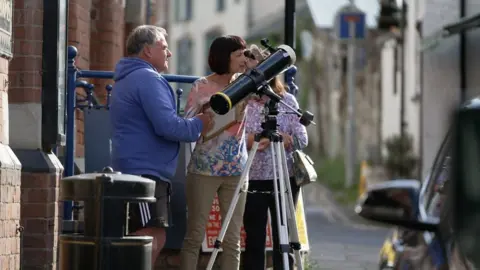
"I think we naturally have a better view of the sky than most areas," explained Leigh Harling-Bowen, a resident and amateur astronomer.
"One of the faintest things you can see at night with the naked eye is called the Triangulum galaxy.
"With the increasing light pollution many people won't be able to see it for much longer and it isn't a legacy that I want to leave our children and grandchildren."
Leigh and other residents started a campaign to make Presteigne one of only a handful of globally-recognised dark skies communities. There are only three in Wales with the title - the Elan Valley, Brecon Beacons, and Snowdonia.
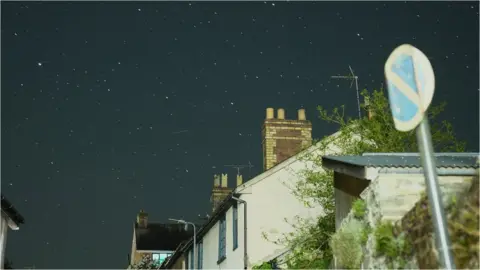
To achieve that status the town and its residents need to prove they've shown "exceptional dedication" to preserving the night sky.
But for any place with a couple of thousand inhabitants who still need to travel, work and socialise after sundown, tackling light pollution is no easy task.
"It's about using the right light, at the right time, in the right place," explained Kerem Asfuroglu, from Dark Source lighting designers, who has spent the past few years advising the town.
"In Presteigne their biggest challenge was their existing street lighting. The light was a very intrusive, cool, white light."
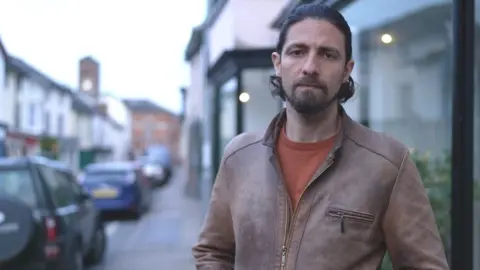
The existing street lighting meant for many, despite their rural location, seeing the stars at night proved challenging.
So, the community and local councils decided to change things, one bulb at a time.
"We've used amber lighting," explained Kerem. "We've faced that lighting downwards and we've dimmed it at different times of the day when it's not needed."
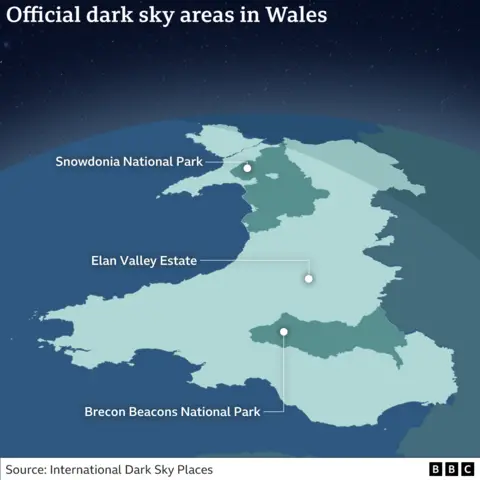

The result is a soft orange glow, reminiscent of the way streets might have appeared a century ago with incandescent lamps.
"You'd think you would feel less well illuminated, but it doesn't. You've got all the light you need," said local B&B owner Cris Ruby.
"If you're walking at night, you're not aware of it feeling more dangerous or that you can't see what's going on."
To be fair, it would be difficult to feel unsafe in Presteigne. Walking around the town in the early hours, the only disturbance to be found was someone snoring from a flat above the high street.
However, the experts who have worked on the project suggest visibility can actually be better at night, as having the bright lights many of us are accustomed to can create shadows and dark spots elsewhere.
Will other places catch on?
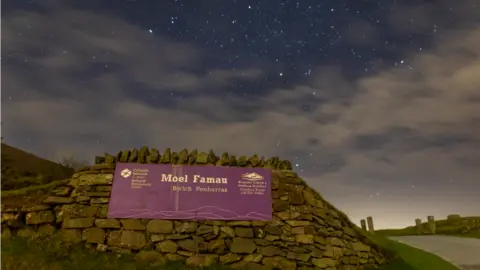 Dylan Parry Evans
Dylan Parry EvansPowys council, which oversaw the project in Presteigne, has been impressed enough to pledge £10m over the next decade to other towns in mid Wales looking to make similar changes to their street lighting.
Along with allowing residents and visitors a clear view of the stars, it's also estimated the changes could save 3.5 tonnes of CO2 emissions each year, and help bats, birds and other wildlife.
Those behind Presteigne's push for dark skies status hope the momentum could inspire a much wider movement.
"Wales itself could even potentially become the first dark sky nation," said Kerem.
"As far as we know it's the closest country to achieving that in Europe. Around 18% of Wales is under protected dark skies, because it's full of reserves, parks and sanctuaries.
"A dark skies community is obviously a different tier entirely, because it's much more difficult to achieve as you're changing an area where people still need to get on with their lives and function.
"Therefore, this project has a great potential impact in inspiring other communities to do the same."
If any residents were having doubts about the impact on their night skies, Leigh and his friend Ken are on hand to show them.
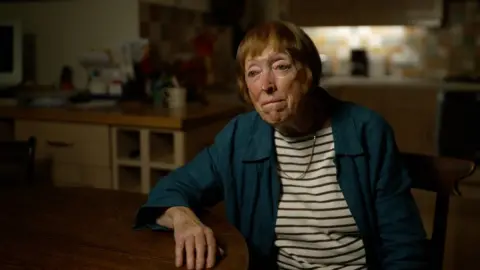
The pair often spend their evenings taking telescopes down to the corner of Presteigne's High Street to "show people the stars".
"It's quite awe inspiring to stand in the middle of my lawn and look up," said Cris Ruby.
"It's magical now, you have this 360-degree panorama of familiar constellations or planets. It just takes your breath away.
"It can make you feel so small and unimportant, which can be incredibly good and grounding."
The community in Presteigne hope to send their application to the International Dark Skies Association for approval by the end of summer.
- Watch more on Wales Live at 22:30 BST on BBC One Wales or catch up after on BBC iPlayer.
